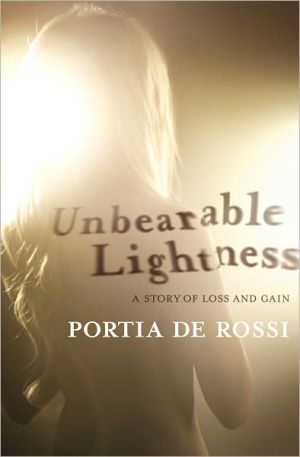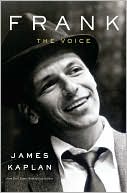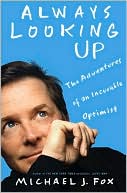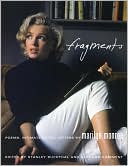Unbearable Lightness: A Story of Loss and Gain
Now in paperback, the New York Times bestselling memoir from Portia de Rossi explores the truth of her long battle to overcome anorexia and bulimia—“an unusually fresh and engrossing memoir of both Hollywood and modern womanhood” ( Los Angeles Times, 5 stars).\ In this groundbreaking memoir, Portia de Rossi reveals the pain and illness that haunted her for decades, from the time she was a twelve-year-old girl working as a model in Australia, through her early rise to fame as a cast member of...
Search in google:
“I didn’t decide to become anorexic. It snuck up on me disguised as a healthy diet, a professional attitude. Being as thin as possible was a way to make the job of being an actress easier . . .” Portia de Rossi weighed only 82 pounds when she collapsed on the set of the Hollywood film in which she was playing her first leading role. This should have been the culmination of all her years of hard work—first as a child model in Australia, then as a cast member of one of the hottest shows on American television. On the outside she was thin and blond, glamorous and successful. On the inside, she was literally dying. In this searing, unflinchingly honest book, Portia de Rossi captures the complex emotional truth of what it is like when food, weight, and body image take priority over every other human impulse or action. She recounts the elaborate rituals around eating that came to dominate hours of every day, from keeping her daily calorie intake below 300 to eating precisely measured amounts of food out of specific bowls and only with certain utensils. When this wasn’t enough, she resorted to purging and compulsive physical exercise, driving her body and spirit to the breaking point. Even as she rose to fame as a cast member of the hit television shows Ally McBeal and Arrested Development, Portia alternately starved herself and binged, all the while terrified that the truth of her sexuality would be exposed in the tabloids. She reveals the heartache and fear that accompany a life lived in the closet, a sense of isolation that was only magnified by her unrelenting desire to be ever thinner. With the storytelling skills of a great novelist and the eye for detail of a poet, Portia makes transparent as never before the behaviors and emotions of someone living with an eating disorder. From her lowest point, Portia began the painful climb back to a life of health and honesty, falling in love with and eventually marrying Ellen DeGeneres, and emerging as an outspoken and articulate advocate for gay rights and women’s health issues. In this remarkable and beautifully written work, Portia shines a bright light on a dark subject. A crucial book for all those who might sometimes feel at war with themselves or their bodies, Unbearable Lightness is a story that inspires hope and nourishes the spirit. Publishers Weekly The author, an actor in movies and TV, (including Ally McBeal, Arrested Development, and Better Off Ted), model, and gay rights advocate, writes that "playing the role of heterosexual while fantasizing about being a homosexual had been my reality since I was a child." It's one she played into her 20s, when she was for three years married to a man. Now, she is married to Ellen DeGeneres, whom she met in 2001 after recovering from anorexia and bulimia. De Rossi nicely chronicles the years in between, during which she starved herself to 80 pounds. She artfully draws the reader into the tension of a life lived in secrecy: did anybody notice she lunges rather than walks, the better to burn calories? will anyone guess she is gay? when she nearly fainted, was anyone around? While some details could be viewed as anorexia how-tos, they make it possible to comprehend the twisted logic of de Rossi's frantic daily pursuits, and grasp the enormity of her achievement in overcoming her problems. The path de Rossi took to her happy ending is well worth reading about: her story is a cautionary tale, an inspiration, and a triumph. (Nov.)
PROLOGUE\ HE DOESN’T WAIT until I’m awake. He comes into my unconscious to find me, to pull me out. He seizes my logical mind and disables it with fear. I awake already panic-stricken, afraid I won’t answer the voice correctly, the loud, clear voice that reverberates in my head like an alarm that can’t be turned off.\ What did you eat last night?\ Since we first met when I was twelve he’s been with me, at me, barking orders. A drill sergeant of a voice that is pushing me forward, marching ahead, keeping time. When the voice isn’t giving orders, it’s counting. Like a metronome, it is predictable. I can hear the tick of another missed beat and in the silence between beats I anxiously await the next tick; like the constant noise of an intermittently dripping faucet, it keeps counting in the silences when I want to be still. It tells me to never miss a beat. It tells me that I will get fat again if I do.\ The voice and the ticks are always very loud in the darkness of the early morning. The silences that I can’t fill with answers are even louder. God, what did I eat? Why can’t I remember?\ I breathe deeply in an attempt to calm my heartbeat back to its resting pulse. As I do, my nostrils are filled with stale cigarette smoke that hung around from the night before like a party guest who’d passed out on the living room sofa after everybody else went home. The digital clock reads 4:06, nine minutes before my alarm was set to wake me. I need to use the restroom, but I can’t get out of bed until I can remember what I ate.\ My pupils dilate to adjust to the darkness as if searching for an answer in my bedroom. It’s not coming. The fact that it’s not coming makes me afraid. As I search for the answer, I perform my routine check. Breasts, ribs, stomach, hip bones. I grab roughly at these parts of my body to make sure everything is as I left it, a defensive measure, readying myself for the possible attack from my panic-addled brain. At least I slept. The last few nights I’ve been too empty and restless, too flighty—like I need to be weighted to my bed and held down before I can surrender to sleep. I’ve been told that sleep is good for weight loss. It recalibrates your metabolism and shrinks your fat cells. But why it would be better than moving my legs all night as if I were swimming breaststroke I don’t really know. Actually, now that I think about it, it must be bullshit. Swimming like someone is chasing me would have to burn more calories than lying motionless like a fat, lazy person. I wonder how long I’ve been that way. Motionless. I wonder if that will affect my weight loss today.\ I feel my heartbeat, one, two, three—it’s quickening. I start breathing deeply to stop from panicking, IN one two, OUT three four . . .\ \ Start counting\ 60\ 30\ 10 =\ 100\ \ I start over. I need to factor in the calories burned. Yesterday I got out of bed and walked directly to the treadmill and ran at 7.0 for 60 minutes for a total of negative 600 calories. I ate 60 calories of oatmeal with Splenda and butter spray and black coffee with one vanilla-flavored tablet. I didn’t eat anything at all at work. And at lunch I walked on the treadmill in my dressing room for the hour. Shit. I had only walked. The fan I had rigged on the treadmill to blow air directly into my face so my makeup wouldn’t be ruined had broken. That’s not true, actually. Because I’m so lazy and disorganized, I’d allowed the battery to run down so the plastic blades spun at the speed of a seaside Ferris wheel. I need that fan because my makeup artist is holding me on virtual probation at work. While I am able to calm down the flyaway hairs that spring up on my head after a rigorous workout, the mascara residue that deposits under my eyes tells the story of my activities during my lunch break. She had asked me to stop working out at lunch. I like Sarah and I don’t want to make her job more difficult, but quitting my lunchtime workout isn’t an option. So I bought a fan and some rope and put together a rig that, when powered by fully charged batteries, simulates a head-on gale-force wind and keeps me out of trouble.\ As I sit up in bed staring into the darkness, my feet making small circles to start my daily calorie burn, I feel depressed and defeated. I know what I ate last night. I know what I did. All of my hard work has been undone. And I’m the one who undid it. I start moving my fingers and thumbs to relieve the anxiety of not beginning my morning workout because I’m stuck here again having to answer the voice in my head.\ It’s time to face last night. It was yogurt night, when I get my yogurt ready for the week. It’s a dangerous night because there’s always a chance of disaster when I allow myself to handle a lot of food at one time. But I had no indication that I was going to be in danger. I had eaten my 60-calorie portion of tuna normally, using chopsticks and allowing each bite of canned fish to be only the height and width of the tips of the chopsticks themselves. After dinner, I smoked cigarettes to allow myself the time I needed to digest the tuna properly and to feel the sensation of fullness. I went to the kitchen feeling no anxiety as I took out the tools I needed to perform the weekly operation: the kitchen scale, eight small plastic containers, one blue mixing bowl, Splenda, my measuring spoon, and my fork. I took the plain yogurt out of the fridge and, using the kitchen scale, divided it among the plastic containers adding one half teaspoon of Splenda to each portion. When I was satisfied that each portion weighed exactly two ounces, I then strategically hid the containers in the top section of the freezer behind ice-crusted plastic bags of old frozen vegetables so the yogurt wouldn’t be the first thing I saw when I opened the freezer door.\ Nothing abnormal so far.\ With that, I went back to the sofa and allowed some time to pass. I knew that the thirty minutes it takes for the yogurt to reach the perfect consistency of a Dairy Queen wasn’t up, and that checking in on it was an abnormality, but that’s exactly what I did. I walked into the kitchen, I opened the freezer, and I looked at it. And I didn’t just look at the portion I was supposed to eat. I looked at all of it.\ I slammed the freezer door shut and went back to the living room. I sat on the dark green vinyl sofa facing the kitchen and smoked four cigarettes in a row to try to take away the urge for that icy-cold sweetness, because only when I stopped wanting it would I allow myself to have it. I didn’t take my eyes off the freezer the whole time I sat smoking, just in case my mind had tricked me into thinking I was smoking when I was actually at that freezer bingeing. Staring at the door was the only way I could be certain that I wasn’t opening it. By now the thirty minutes had definitely passed and it was time to eat my portion. I knew the best thing for me in that moment would be to abstain altogether, because eating one portion was the equivalent of an alcoholic being challenged to have one drink. But my overriding fear was that the pendulum would swing to the other extreme if I skipped a night. I’ve learned that overindulging the next day to make up for the 100 calories in the “minus” column from the day before is a certainty.\ I took out my one allotted portion at 8:05 and mashed it with a fork until it reached the perfect consistency. But instead of sitting on the sofa savoring every taste in my white bowl with green flowers, using the fork to bring it to my mouth, I ate the yogurt from the plastic container over the kitchen sink with a teaspoon. I ate it fast. The deviation from the routine, the substitution of the tools, the speediness with which I ate silenced the drill sergeant and created an opening that invited in the thoughts I’m most afraid of—thoughts created by an evil force disguising itself as logic, poised to manipulate me with common sense. Reward yourself. You ate nothing at lunch. Normal people eat four times this amount and still lose weight. It’s only yogurt. Do it. You deserve it.\ Before I knew it, I was on the kitchen floor cradling the plastic Tupperware containing Tuesday’s portion in the palm of my left hand, my right hand thumb and index finger stabbing into the icy crust. I ran my numb, yogurt-covered fingers across my lips and sucked them clean before diving into the container for more. As my fingers traveled back and forth from the container to my mouth, I didn’t have a thought in my head. The repetition of the action lulled the relentless chatter into quiet meditation. I didn’t want this trancelike state to end, and so when the first container was done, I got up off the floor and grabbed Wednesday’s yogurt before my brain could process that it was still only Monday. By the time I came back to my senses, I had eaten six ounces of yogurt.\ The alarm on my bedside table starts beeping. It’s 4:15 a.m. It’s time for my morning workout. I have exactly one hour to run and do sit-ups and leg lifts before I get in the car to drive forty-five minutes to the set for my 6:00 a.m. makeup call. I don’t have any dialogue today. I just need to stand around with the supercilious smirk of a slick, high-powered attorney while Ally McBeal runs around me in circles, working herself into a lather of nerves. But even if I’d had actual acting to think about, my only goal today is to be comfortable in my wardrobe. God, I feel like shit. No matter how hard I run this morning, nothing can take away the damage done. As I slip out of bed and do deep lunges across the floor to the bathroom, I promise myself to cut my calorie intake in half to 150 for the day and to take twenty laxatives. That should do something to help. But it’s not the weight gain from the six ounces of yogurt that worries me. It’s the loss of self-control. It’s the fear that maybe I’ve lost it for good. I start sobbing now as I lunge my way across the floor and I wonder how many calories I’m burning by sobbing. Sobbing and lunging—it’s got to be at least 30 calories. It crosses my mind to vocalize my thoughts of self-loathing, because speaking the thoughts that fuel the sobs would have to burn more calories than just thinking the thoughts and so I say, “You’re nothing. You’re average. You’re an ordinary, average, fat piece of shit. You have no self-control. You’re a stupid, fat, disgusting dyke. You ugly, stupid, bitch!” As I reach the bathroom and wipe away the last of my tears, I’m alarmed by the silence; the voice has stopped.\ When it’s quiet in my head like this, that’s when the voice doesn’t need to tell me how pathetic I am. I know it in the deepest part of me. When it’s quiet like this, that’s when I truly hate myself.\ © 2010 Portia de Rossi
\ From Barnes & NobleActress Portia de Rossi is a former star of Ally McBeel and Arrested Development and the wife of Ellen Degeneres, but her memoir is no mere celebrity call-out. Instead, Unbearable Lightness is a frank, powerful description of de Rossi's bouts with eating disorder and how they affected every facet of her life. In hardcover, this book received strong reader support and affirmative reviews; the Washington Post critic called it a "stark, well-written portrait of how de Rossi lost control of her life as she became consumed by her struggle for perfection and acceptance." A Barnes & Noble Bestseller, now in trade paperback and NOOK Book.\ \ \ \ \ \ Publishers WeeklyThe author, an actor in movies and TV, (including Ally McBeal, Arrested Development, and Better Off Ted), model, and gay rights advocate, writes that "playing the role of heterosexual while fantasizing about being a homosexual had been my reality since I was a child." It's one she played into her 20s, when she was for three years married to a man. Now, she is married to Ellen DeGeneres, whom she met in 2001 after recovering from anorexia and bulimia. De Rossi nicely chronicles the years in between, during which she starved herself to 80 pounds. She artfully draws the reader into the tension of a life lived in secrecy: did anybody notice she lunges rather than walks, the better to burn calories? will anyone guess she is gay? when she nearly fainted, was anyone around? While some details could be viewed as anorexia how-tos, they make it possible to comprehend the twisted logic of de Rossi's frantic daily pursuits, and grasp the enormity of her achievement in overcoming her problems. The path de Rossi took to her happy ending is well worth reading about: her story is a cautionary tale, an inspiration, and a triumph. (Nov.)\ \ \ Library JournalThe transformation of Australian schoolgirl Amanda Lee Rogers into Hollywood star Portia de Rossi was more horror story than fairy tale. As if anorexia, bulimia, and exercise addiction were not enough, de Rossi lived her Ally McBeal years in fear of being outed by the tabloid press. This is a frank account of what drives a 5' 8" woman to eat 200 calories a day in order to maintain a weight of 82 pounds and how to go about doing so.What I Am Telling My Friends This is a terrifying book; only the knowledge that de Rossi is alive kept me reading through some of the more horrific passages. Unfortunately, one of the keys to de Rossi's recovery-marrying Ellen DeGeneres-is not a therapy available to most. Therese Purcell Nielsen, "Memoir Short Takes", Booksmack!, 11/4/10\ \ \ \ \ Erin Williams…a stark, well-written portrait of how de Rossi lost control of her life as she became consumed by her struggle for perfection and acceptance.\ —The Washington Post\ \ \ \ \ From the Publisher“Written with artistry, compelling insight and lucid frankness, [Unbearable Lightness] offers solid hope and inducement to initiate the odyssey toward self-knowledge and acceptance.”\ —The New York Times\ “A stark, well-written portrait of how De Rossi lost control of her life as she became consumed by her struggle for perfection and acceptance.”\ —Washington Post\ “In prose as simply elegant—and as powerful—as a little black dress, De Rossi weaves together three themes—the impact of a loving, but lonely girlhood as the child of a single mother, the corrosive effect of constant doubts about her appearance and the internal struggle over her sexuality.”\ —Los Angeles Times (5 star review)\ “De Rossi’s attention to detail is hypnotic.”\ —USA Today\ “The blunt, pity-free matter-of-factness with which de Rossi shares secrets and lies about her eating disorders and her sexuality makes this forthright confessional story at once shocking and instructional, especially for younger women who may be secretly suffering on their own.”\ —Entertainment Weekly\ “De Rossi artfully draws the reader into the tension of a life lived in secrecy...her story is a cautionary tale, an inspiration, and a triumph.”\ —Publishers Weekly\ “An unflinching self-portrait...frank, brave, and revelatory.”\ —Booklist\ “Breathtakingly honest, brutal and beautiful.”\ —Jonathan Safran Foer\ “De Rossi tells her story with genuine insight and unflinching honesty. You will cheer her on.”\ —Jeannette Walls\ “De Rossi’s memoir reminds us that fame and celebrity are no substitute for feeling comfortable in one’s own skin.”\ —Jodi Picoult\ \ \







